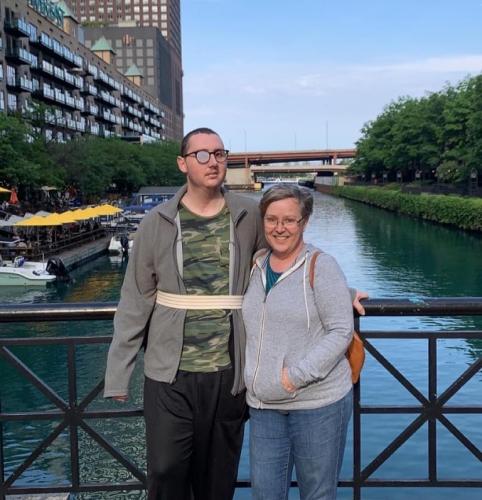We have a house full of pets, two cats, Hank and Bingus, two green-Cheeked conures named Apple and Kiwi, and one dwarf hamster. Aidan and I love biking, camping and backpacking and are exploring trying out bike-packing in Northern Michigan next summer.
Brooke's Journey with TBI
I’ve been a Registered Nurse for over 20 years. My experience runs the gamut-Intensive Care, Emergency Department, Oncology, Orthopedic Trauma, Case Management, Disease Management and Utilization Management. Despite working in so many different areas of nursing, I had very little experience with Traumatic Brain Injuries. That all changed on 01/25/2022, when my only child, my 22 year-old son Aidan, suffered a severe TBI as a result of a single car accident on his way to work. Aidan’s injuries included bilateral temporal bone fractures, left occipital fracture and multiple skull base fractures. He had subarachnoid hemorrhage, intraventricular hemorrhage, subdural hematomas, diffuse axonal injury and a left internal carotid artery dissection which resulted in multifocal left-sided ischemic strokes. Upon my arrival at the hospital, I was told his injuries were almost certainly not survivable. In the event he did survive, he would have no meaningful neurological recovery. Over the course of the first night, as his strokes evolved and his brain began to swell and shift, I was advised the picture was as grim as could be. Multiple doctors told me there was no hope, it was only a matter of time. Aidan, however, had a different plan.
We are now approaching 11 months post TBI. He was able to transfer to Shirley Ryan Ability Lab in Chicago for acute inpatient rehabilitation just over 3 weeks after his accident. He stayed there for 2 months as an inpatient and another 2 months as an outpatient. Today, Aidan manages almost all of his own daily activities, with the exception of organizing his medications, arranging transportation and scheduling his medical appointments. He makes many of his own meals, does his own and his girlfriend’s laundry, keeps up the yard, cares for his pet birds, plays video games and hits the gym 3 times a week. He still receives speech, occupational and physical therapy twice a week, as well as participating in aphasia conversation groups, TBI support groups and adaptive adventure sports. Soon, he’s looking forward to beginning vocational rehab and getting back to work as an electrician with IBEW 683. We have so much hope for his future.
Why does Brooke want to be an ambassador?
When Aidan suffered his TBI, I didn't know where to turn for information and guidance. There is a lot of misinformation and bad information out there...and I was so exhausted. I needed good, research-based information that didn't require a Herculean effort to ingest. I found MSKTC in the wee hours of the night, surfing the web while I kept vigil at his bedside. There, I learned about disorders of consciousness and minimally conscious states. I realized this described Aidan's condition at the time. I learned about inpatient rehabilitation facilities that have treatments specifically designed for patients who are experiencing a disorder of consciousness. I found a facility that offered a minimally conscious program in a neighboring state. I advocated for him to go there, rather than being sent to a long-term acute care hospital or a nursing home. Nobody at the hospital he was in had even heard of such a program! Had it not been for MSKTC, I shudder to think where Aidan's recovery would be right now. I want to be an ambassador to help get this wonderful resource into the hands of other families that find themselves where we were. Having knowledge will provide families with invaluable tools to help them be advocates, providing their loved ones the best possible chance for the best possible outcome.
What does Brooke do as an ambassador?
Since Aidan's injury, I've become involved in state-level projects to improve the care of TBI patients and especially those experiencing disorders of consciousness. I've also recently begun exploring ways to utilize artificial intelligence/machine learning to help identify patients early in their hospital course who might benefit from disorders of consciousness rehabilitation.
